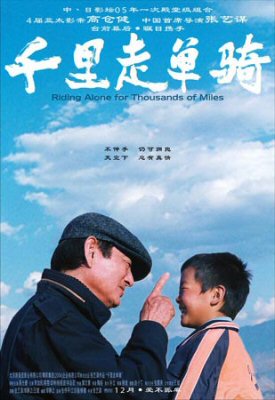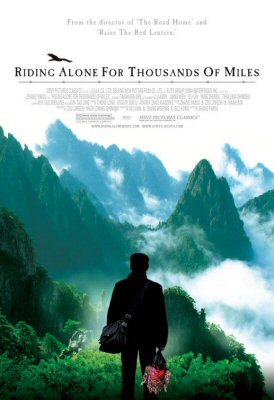 2007 Program - Reviews, credits and stills
2007 Program - Reviews, credits and stills 2007 Program - Reviews, credits and stills
2007 Program - Reviews, credits and stills


After the relative disappointment of his two recent wuxia films - both Hero (Ying xiong) and House of Flying Daggers (Shi mian mai fu) strongly favour style over substance, and although visually stunning, generally leave one unsatisfied - Yimou Zhang returns to the more intimate approach that made The Road Home (Wo de fu qin mu qin) such a wonderful film. Riding Alone For Thousands Of Miles (Qian li zou dan qi) doesn't quite scale those heights, but for fans there is much to enjoy.
Riding Alone For Thousands Of Miles (Qian li zou dan qi)Focussing almost entirely on one character, Riding Alone For Thousands Of Miles is a story of significant depth, powerfully exploring the nature of connectedness, and the meaning of family. Takada - played by Ken Takakura as a resolute, determined man, intent on redressing a past breakdown in his relationship with his son - goes on a physical journey in search of the missing link in his son's life work, but it becomes more a journey of the soul.
There is much to admire in this quest. Zhang uses the language barriers that face a Japanese fisherman travelling in Yunnan Province in China to symbolise the barrier between him and his son - the use of local 'interpreters' fraught with potential for misunderstanding. His lifeline, a mobile telephone that links him to the only person with enough of both languages to help him, is often out of range, and this metaphor works very well indeed. From his attempts to communicate even the most basic of thoughts, he learns that one must always keep trying, keep looking for a way to get through.
Zhang does not forget his unique visual style completely, although he certainly tones down the vibrant colours of Hero and House of Flying Daggers - here he favours letting the incredible landscape of the region speak for itself. With earthy reds, and rocks and mountains covered in snow, Zhang shows us some amazing country; an environment that is both beautiful and harsh. Like the use of barriers to communication, the terrain is used to emphasise the journey Takada is on - the Japanese ocean fisherman in the unrelenting Chinese mountains.
Zhang never once oversteps or allows flashy sentiment to creep in; his direction is as understated as the performance of Takakura. Both excel, allowing a subtle story to develop, of relationships and love in spite of division. Takakura, whose role was written for him by Zhang, seems to be Takada, and one can't help but feel sorry for this man who is trying so hard against all his own history to be something he isn't. Takakura conveys all of this bewilderment, frustration and emotion with few words, relying predominantly on expression and body language, in a performance of significant skill.
If you found the flashy visuals and action of the last two films of Yimou Zhang to your liking, Riding Alone For Thousands Of Miles may not be your cup of tea. If you favour the quiet intimate struggle over civil war, however, there is much to be enjoyed here.
Rating: ![]()
![]()
![]()
![]()
Now that Chinese director Zhang Yimou has finally, thankfully, got all those hidden-wire martial-arts jumping-about films out of his system ( House of Flying Daggers, Hero) he can get back to what he does best - deeply moving films about simple emotions and complex people.
Estranged from his son for years, ageing Japanese fisherman Takada (Ken Takakura) attempts a reconciliation but the gesture is rejected.
In an elaborate scheme to demonstrate his desire to reconnect, Takada undertakes to finish a project of his son's - to film a noted Chinese singer performing Riding Alone for Thousands of Miles, an opera about an estranged father and son who reconcile. Takada encounters a third echo of his situation when he finds the star and his son are also estranged.
Apart from being one of the most visually lyrical of Chinese filmmakers, with classics such as Red Sorghum (1987) and Raise the Red Lantern (1991), Yimou has the singular ability to take the stuff of straightforward melodrama and give it emotional ballast. He did it with Not One Less and The Road Home (both 1999), and does so again here. Splendidly. Yimou never overplays his hand, preferring selective use of close-ups to allow an emotion, whether joy, regret or acceptance - the film's main themes - to play out naturally, without undue adornment.
Riding Alone is a quiet, dramatically rich, deeply rewarding film that demonstrates, yet again, how great directors get better with age.
Rating ![]()
![]()
![]()
![]()
From three-time Academy Award nominated director Zhang Yimou comes a moving story of one man's journey across China's heartland. For the first time in many years, Takata Gou-ichi (Takakura Ken) takes the bullet train to Tokyo from the quiet fisherman's village where he lives on the north-west coast of Japan. His daughter-in-law, Rie (Terajima Shinobu) had telephoned to tell him that his son, Ken-ichi (Nakai Kiichi) is seriously ill, and asking for his father.
But when he arrives in the city, Takata finds that Rie was not entirely truthful: Ken-ichi has been hospitalized, but after years of painful estrangement, he still refuses to see Takata. Crushed, the old man quietly slips out of the hospital, but not before Rie gives him a videotape to watch. What Takata sees on the tape, Rie hopes, will help him get to know his son again.
Takata plays the tape and learns that Ken-ichi is studying a form of Chinese exorcising drama that dates back more than a thousand years. Ken-ichi had travelled all the way to Yunnan Province in Southern China to see the famous actor LI Jiamin perform, but the actor was ill and unable to sing. Li promised to sing the legendary song Riding alone for thousands of miles from the literary classic Romance of the Three Kingdoms for Ken-ichi if he returns to Yunnan the following year.
Hoping to bridge the gap between himself and his son, Takata decides to find Li Jiamin and videotape his performance for the dying Ken-ichi. As the old man begins an odyssey into the heart of China, he encounters a number of strangers who colour his journey - from well-meaning translators who guide him through China's idiosyncrasies, to prison wardens anxious to promote Chinese culture abroad, to a young runaway with a complicated father-son relationship of his own.
What Takata discovers on his journey is kindness... and a sense of family he thought he had lost long ago.